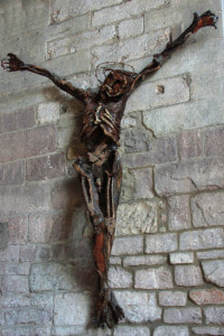 Leading up to the tenth anniversary of the London bombings on 7/7 in 2005 I returned to my reflections of 2009 (read here) for a sermon – challenging the temptation after such events to ‘get things back to normal’, hiding them away rather than allowing ourselves to engage with a motivation to change the world in which we live for the better. This inevitably has something to do with engaging with what God is doing through us and around us. I was then surprised to learn that my eldest daughter had, at some point, observed that I never talked about the events of that day and that they had clearly changed me. I wonder if I have ‘buried’ my experiences and, if so, has the change in me been for the better? There are two reasons, I reflect, why I do not share the experience of that day easily. Firstly, it is enough to experience such horrors (even from a ‘safe’ distance of a few yards) without then inflicting others with the reality. Secondly, I have not had the tragedy of losing a relative or friend and there is a sense that it is not my grief to share. However, I do have my own experience and memory of that day and I know that I should not ignore it or shut it away, as of no significance. Last night Judy and I watched, rather tearfully, ‘A Song for Jenny’, a dramatisation of the experience of one victim’s family. A number of things stay with me: Grief found a voice in a number of ways and was certainly not suppressed. Julie Williamson, Jenny’s mum and an Anglican priest, screaming and throwing things while others worried over domestic arrangements for the dog. A desire to know every detail it was possible to know about how and why Jenny died and thus to share in her pain and death. The recitation in the funeral service of literature that was significant for Jenny – a sharing of her life and passions. There was no ‘hiding away’ in these. Faith also had a significant part, despite the understandable doubts that such horrific tragedy brings. Julie feels that she must see the photographs that investigators have taken cataloguing Jenny’s death. They are for Julie ‘the stations of Jenny’s cross and I as her mother must share them’. Visiting the Chapel of Rest Julie, as both mother and priest, anoints her daughter. She cannot recall the liturgical words, but rehearses the various ways in which, as mother, she has anointed the life of Jenny, ultimately commending her to God. Grief is very personal but should not, because of that, be closeted away. We may express it in a wide variety of ways and each is our way of sharing the suffering, of marking the Stations of the Cross. This description helps me to understand that I share Christ’s suffering while he shares mine. I trust too that the fruits of ‘resurrection’ will be real too!
0 Comments
Leave a Reply. |
Archives
March 2024
|
 RSS Feed
RSS Feed
